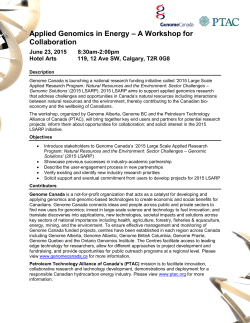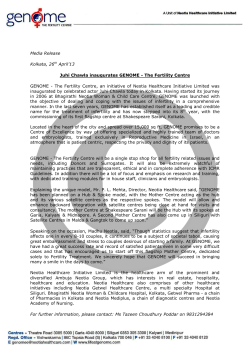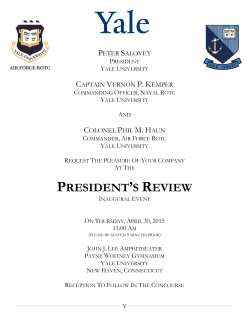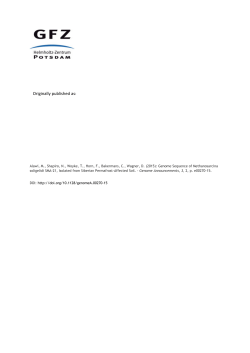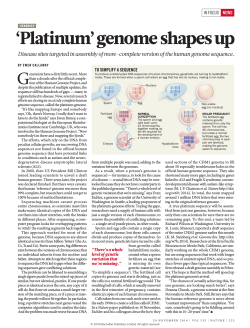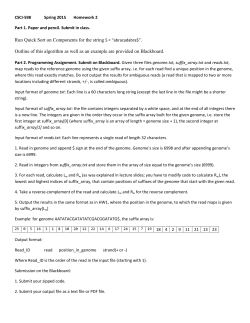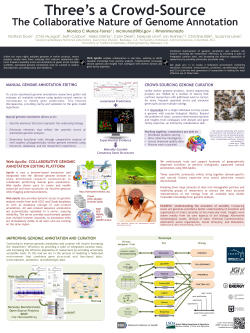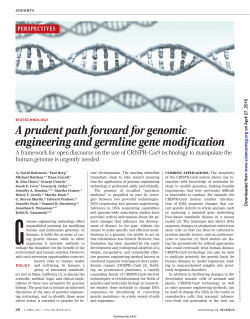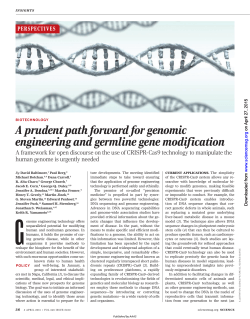
Comparative Genome Annotation of Major Tsetse Fly Species Call
Comparative Genome Annotation of Major Tsetse Fly Species Call for Applications Workshop Theme: From Genomes to Functions: Analyzing the Glossina genome cluster Efforts of the International Glossina Genome Initiative (IGGI) resulted in the annotation and publication of the Glossina morsitans morsitans genome in April, 2014. The genome sequence of Glossina is of interest not only as an important vector but also for evolutionary comparison due to its positioning in the higher Diptera. Recent work supported by the National Institutes of Health USA has generated five additional Glossina genomes (G. pallidipes, G. brevipalpis, G. austeni, G. fuscipes fuscipes and G. gambiensis palpalis) and the genomes for two related dipterans, a non-vector blood feeder (stable fly, Stomoxys calcitrans) and a nonblood feeding dipteran relative (house fly, Musca domestica). These resources will facilitate comparative analysis with the G. m. morsitans genome and other available genomes to understand the various phenotypes that mediate differential vector competence, haematophagy, viviparity, host-seeking and discriminatory biology. These efforts may highlight novel targets and approaches for control of tsetse fly populations. The Yale School of Public Health (YSPH) and Biotechnology Research Institute-Kenya Agricultural and Livestock Research Organisation (BRI-KALRO), in collaboration with the International Center of Insect Physiology and Ecology (ICIPE), the Biosciences eastern and central Africa -International Livestock Research Institute Hub (The BecA-ILRI Hub), the Center for Biotechnology and Bioinformatics –University of Nairobi (CEBIB-UoN) and South African National Bioinformatics Institutes (SANBI), invite applications for participation in an up-coming workshop on comparative analysis of the five major tsetse species. The workshop will take place at BRI, Muguga, Kenya on March 15th – 21st , 2015. Scope and Topics The workshop will investigate the differences and similarities among the genomes of the five tsetse species relative to those of the stable and house flies to underpin genetic factors in tsetse flies that are responsible for differences in their bionomics and vectorial capacity. The workshop topics will include annotations of genes associated with chemosensation and vision, immunity, reproductive physiology, horizontal transfer events, digestion, salivary biology, regulatory systems and more! The hands-on annotation efforts will be accompanied by topical lectures on the different physiologies given by experts in these fields. Requirements Evidence of prior training and/or experience in computational biology/bioinformatics. Prior knowledge of genome annotations and participation in the IGGI network will be an advantage. Access to personal/laptop computer. Target Audience Postgraduate students, postdoctoral fellows and junior faculty involved in bioinformatics and/or functional genomics of insects. Prior knowledge on tsetse and trypanosomiasis will be an advantage. Registration for Participation Registration and lunch will be covered by the sponsors. Participants are expected to meet their own accommodation, local and international travel expenses to and from BRI, Muguga, Kenya. Full board is available at $55 per day. The organizers have limited competitive travel and accommodation fellowships for exemplary applicants unable to cater for their expenses. Please indicate your support needs to the organizers when you apply. Application Criteria Interested applicants are required to submit the following documents: 1) Application cover letter (please describe your background, personal area of interest and potential synergy between the training and your career– limit to 1 page) 2) Curriculum vitae 3) Two recommendation letters from persons familiar with the applicant’s potential. Duly completed application and supporting documents should be submitted via e-mail to Drs. Geoffrey Attardo (geoffrey.attardo@yale.edu) and Paul Mireji (peterpaul.mireji@yale.edu) CLOSING DATE: January 31st, 2015
© Copyright 2025


